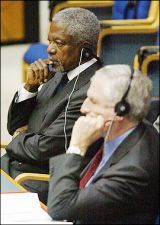Countdown starts for Khartoum and rebels to end war in Sudan
By Mark Turner
LONDON, Nov 22, 2004 (Financial Times) — The success of a high-profile effort by the UN Security Council to bring peace to Sudan rests on six short weeks of talks, diplomats said following a meeting in Nairobi.

|
|
UN Secretary General Kofi Annan and US ambassador at a special session of the UN Security Council, 18 November 2004 in Nairobi. (AFP). |
In its first official meeting abroad in 14 years, the Security Council witnessed the signing on Friday of a pledge by Khartoum and southern rebels to end their 21-year civil war by December 31.
The council believes that given the general international reluctance to intervene more aggressively in Sudan, a comprehensive north-south agreement between the government and the Sudanese People’s Liberation Movement offers the best chance of resolving the country’s many conflicts.
But similar promises to end conflict have been made before and success is far from certain. Meanwhile killings continue in the western region of Darfur, which has been classed a genocide by the US, where a separate rebellion is raging.
The six weeks will also prove a crucial test for John Danforth, US ambassador to the UN, who convinced a sceptical council that the Nairobi trip was important to securing agreement.
A former US envoy to Sudan, Mr Danforth pushed strongly for constructive engagement with Khartoum, arguing that if the government and the SPLM, the two main belligerents, settle their differences other factions will follow.
US and British officials say the north-south agreement meets the aspirations of rebels in Darfur just as much as those in the south.
Diplomats believe that if the parties fulfil their promise a new era of political change will follow, going a long way to meeting the economic and political aspirations of Sudan’s many marginalised groups.
To underscore the message to both the government and rebels that success would be rewarded with many hundreds of millions of dollars, the Security Council passed a resolution that focused more on incentives than threats such as sanctions.
The resolution was crafted after much tough debating and last-minute changes aboard America’s official aircraft Air Force Two as it flew towards Africa.
But aid organisations and pressure groups condemned the council’s unthreatening tone, calling it a dangerous step backwards. They say the UN should have threatened targeted sanctions and supported more decisive action to stop the killings.
“The Sudan government will see this as a letting up in pressure,” said Jemera Rone from Human Rights Watch.
Jan Pronk, the UN’s envoy to Sudan, also wanted more civilian protection. “In terms of conflict resolution, it is taking it forward. In terms of protection it is not,” he told the FT, adding that he was not being given the necessary resources.
Western diplomats insisted that undermining Khartoum at this stage would not work. Given Chinese, Russian and Islamic opposition, UN sanctions were simply not on the table.
Military intervention, especially post Iraq, also appears out of the question. Logistical difficulties aside, there is little prospect of sending western forces to a country at risk from Islamist rebellion while the number of available African troops is also limited.
But despite his incentive-driven strategy, Mr Danforth insisted he was not going soft. He warned both parties that they had to comply. “The violence and atrocities must end now,” he said about Darfur. “You have heard this message clearly from the Security Council – heed it. I cannot emphasise this point more strongly.”
On the north-south deal he said: “We are very very close to peace, but we have been close before.
“Do not let this opportunity slip away.”
